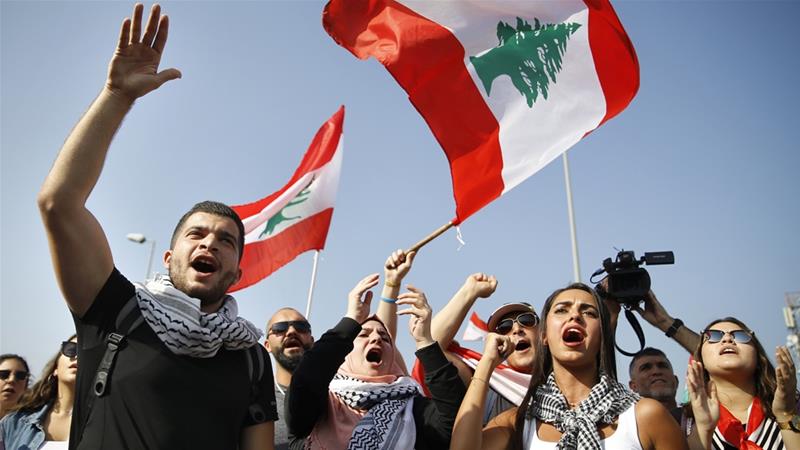Home » Middle East »
Lebanon's Saad Hariri says he does not want to be next PM
Former prime minister hopeful President Aoun will designate new leader amid political deadlock in protest-hit Lebanon.
Lebanon’s outgoing Prime Minister Saad Hariri announced on Tuesday he does not want to lead the next government – a “decisive” move he said aims to expedite the formation of a new cabinet in the protest-hit country.
Hariri resigned last month, bowing to popular pressure from a nationwide street movement demanding a complete overhaul of the government.
Since his resignation on October 29, Lebanon’s bitterly divided political leaders have yet to name a new premier or form a new government.
More:
-
One month on: Hope, defiance as Lebanon protests persist
-
US dollar shortage and Lebanon’s economic crisis
-
‘Revolution fist’, symbol of Lebanon’s uprising, set alight
“I am sticking by the rule ‘not me, rather someone else’ to form a government that addresses the aspirations of the young men and women,” Hariri, Lebanon’s leading Sunni-Muslim politician, said in a statement.
“I have full hope and confidence, after announcing this clear and decisive decision, that the president of the republic … will immediately call the binding parliamentary consultations” to designate a new prime minister, he said.
The prime minister must be a Sunni Muslim according to Lebanon’s sectarian power-sharing system. Hariri is aligned with Western and Gulf Arab states.
The 49-year-old did not name an alternative candidate, but said his decision aims to “open doors to a solution”.
According to sources at the presidential palace, President Michel Aoun will hold binding consultations with members of parliament on Thursday to designate the country’s next prime minister
‘More uncertainty’
Lebanon has faced five weeks of anti-government protests, driven by anger at corruption among the sectarian politicians who have governed the country for decades. Demonstrators want them all to leave office.
No date has been set for the necessary consultations to pave the way for a new cabinet lineup, despite mounting international pressure.
A former finance minister, Mohamad Safadi, had been considered to replace Hariri but withdrew his bid after more protests.
The political deadlock has frustrated demonstrators who have staged persistent protests since October 17.
Al Jazeera’s Zeina Khodr, reporting from the capital Beirut, said Hariri’s announcement will lead to “more uncertainty”.
“The ruling alliance is really in a fix because if they push ahead and form a one-sided government, it will be seen as a confrontational government and it will call into question whether or not the international community will consider it to be legitimate,” she said.
Aoun’s powers include initiating the required parliamentary consultations to appoint a new premier.
The president has said he was open to a government that would include technocrats and representatives of the popular movement, both key demands of the protesters.
However, the demonstrators say they will reject any government that consists of representatives of the established parties.
Hariri said: “It is clear that what is more dangerous than the major national crisis and sharp economic crisis our country is passing through – and which is preventing us from dealing with these two intertwined crises – is the state of chronic denial being expressed on several occasions over the past few weeks.”
There was no immediate response to Hariri’s statement by Aoun or Hezbollah. Hezbollah leader Hassan Nasrallah has said he wants Hariri to stay on as prime minister.
The United States, the United Kingdom, France, the United Nations, the World Bank and credit rating agencies have all urged officials to streamline the process in the wake of a twin political and economic crisis gripping the country.
Threat of escalation
Supporters of the main two Shia groups, Iran-backed Hezbollah and the Amal Movement of Parliament Speaker Nabih Berri, have attacked protesters on several occasions, sparking hours-long clashes on Sunday and Monday.
It was among the worst violence since nationwide demonstrations erupted against the country’s entire political class, of which Hezbollah and Berri are a part.
Amnesty International called on authorities to do more to protect protesters, warning the attacks of the past two days “could well signal a dangerous escalation”.
“The images of the men carrying flags of two of the political parties in government, Hezbollah and Amal, armed with steel batons, knives and stones, chasing and beating protesters in alleyways, setting alight tents and destroying private property in the past two days are extremely worrying and warrant the authorities’ firm and immediate action,” said Lynn Maalouf, Amnesty’s Middle East research director.
Inside Story
Will a new government end unrest in Lebanon?
Source: Read Full Article




